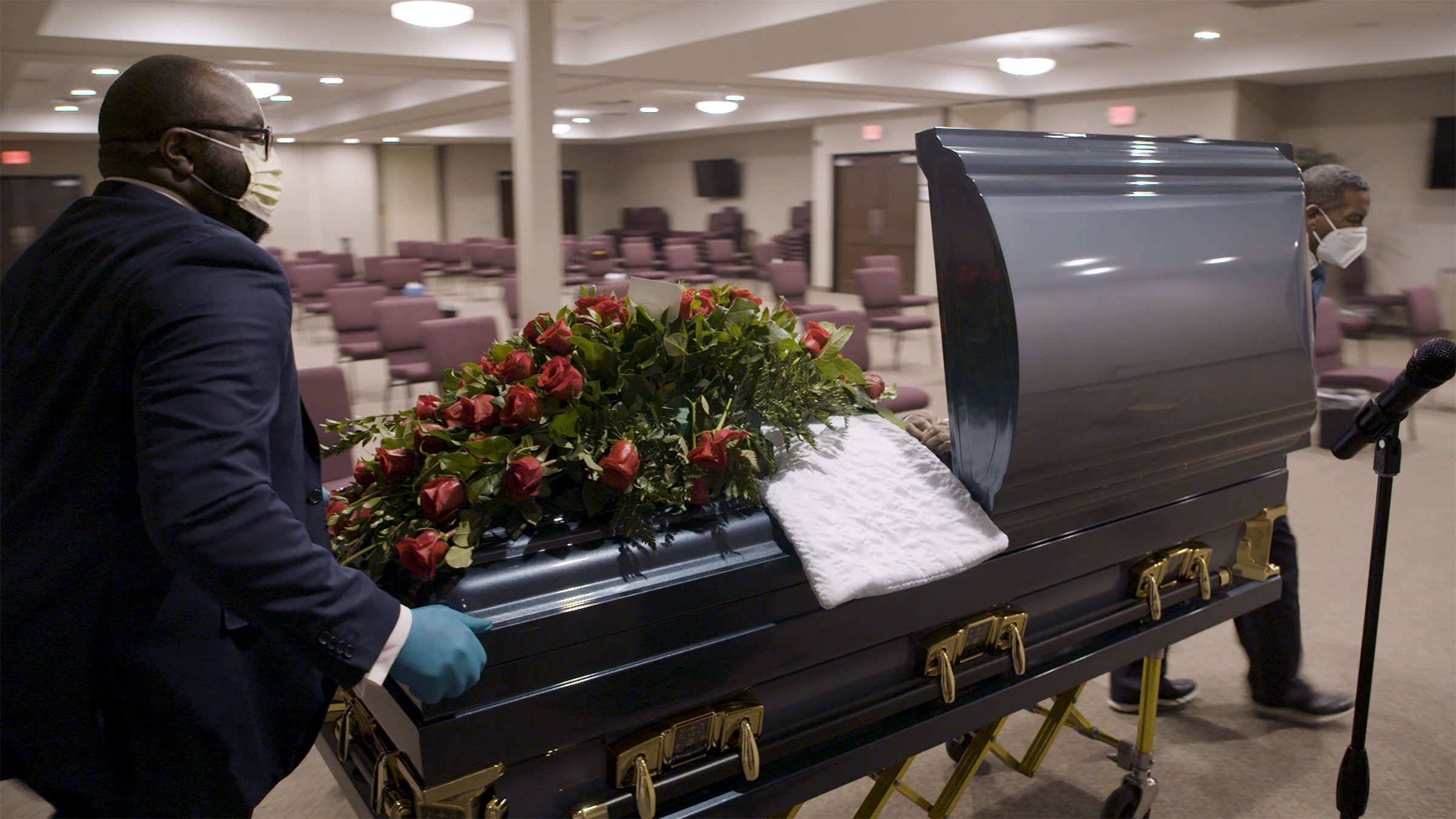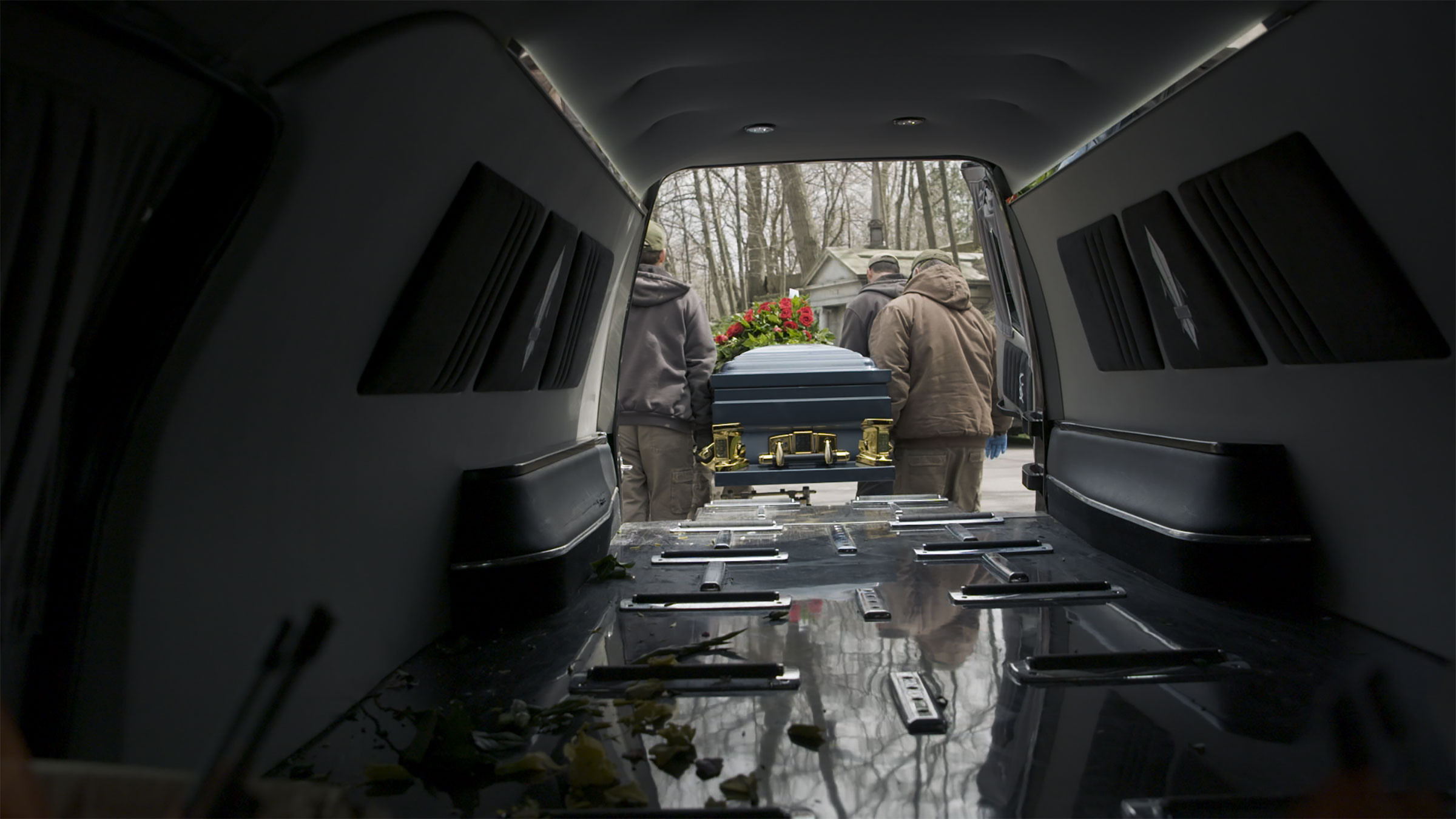On April 29, Stephen Kemp arrived at his office just outside Detroit to a perplexing silence. Since COVID-19 hit the city, the phones at his funeral home had been ringing nonstop. Now, nothing.
Kemp’s wife and colleague, Jacquie, soon popped into his office with an explanation: Comcast was down. No phones, no Internet. The outage lasted until early afternoon—a stretch in which the home put on two funeral services and received one more body. When the deceptive calm finally broke, the bad news began pouring in at the torrential pace that had become the Kemps’ new normal.
The most pressing problem was the local crematory, which had stopped taking bodies for the second time in less than a week. “Closed until Monday,” Kemp explained, leaving a voicemail as he exasperatedly called around in search of a solution—to little avail. All the other nearby crematories were full too. “We’re making it up as we go.”
The metro Detroit area has seen some of the highest numbers of COVID-19 related deaths among U.S. cities—nearly 3,000 as of late April, along with almost 30,000 confirmed cases of the disease. The crisis has disproportionately ravaged the African American community, which makes up the majority of Kemp’s business.

On a normal day, Kemp says he gets one or two calls from new clients. For the last few weeks, it’s been four, five, or sometimes more. It wasn’t long, Kemp says, before the whole system—from hospitals to morgues to funeral homes like his—became overwhelmed. The whiteboard that he and his colleagues use to keep track of cases is overflowing, routinely with people who have the same last names. “It’s difficult for even people in the business to witness,” said Jacquie Kemp of the deluge. “To see people coming at this pace.”
The Kemps already had to rent a refrigerated truck to store overflow; at least 20 remains were kept there. Nearly two dozen more were waiting for burial in the backroom. At any one time, another few are being embalmed in the preparation room, and half a dozen others sit in what used to be a resting room for families during services. The exact count can change by the hour.
“I’ve never had it this full,” said Kemp, standing in his garage, near racks he recently had to buy to keep bodies arranged in as dignified a manner as possible. “Usually this is where my hearse is parked.”
Funeral directors were in short supply before the coronavirus hit, with few young people entering the profession. Kemp was lucky that his son chose to join the business. Still, the family, and the funeral home’s additional staff of about 10 people , have found themselves working 12 to 18 hour days trying to manage the high death toll of the pandemic. But as other frontline workers—from doctors to the national guard—get thanked in local public service ads, death-care professionals are often left off the list.
“I’m probably the least popular person in the world because nobody ever wants to see me. But I’m necessary,” said Kemp, positing the calamity that would ensue if funeral homes stopped taking, disinfecting and processing COVID-19 victims. “Our job is to complete the chain of protecting the general public as last responders.”
This essential service has put Kemp and his employees at risk themselves. His wife contracted—and recovered from—COVID-19, and he thinks that he and his son have also caught the virus, though they haven’t yet been able to get tested (it’s a point he’s been trying to push the mayor on). And as the crisis has deepened, protective equipment has also become increasingly scarce. Kemp’s supplies of shoe covers, Tyvek suits, gloves and masks are all dwindling. If its stock is ever fully depleted, the funeral home would be forced to close.
“Every time you touch one of the bodies, you put your life on the line,” said Kay Smith, a funeral director at the home. Her job routinely involves taking out ventilator tubes, removing adult diapers, draining bodily fluids and other preparation or embalming processes that, these days, could expose her to the coronavirus. But, she says, it’s her calling. “It is rewarding. And it’s not only for the dead. It’s for the living.”
Juanita Jolly tried calling multiple other funeral homes about her father, before Kemp was able to take on the case. Jimmie Jolly died on April 5, at age 70, after contracting COVID-19. “He went in [to the hospital] on Friday, with a fever,” said Jolly. “The next time I saw him was lying in a casket.”
As she made arrangements to celebrate her father’s life, Jolly had to battle not only grief but also social distancing requirements and Michigan limits on gatherings of more than 10 people. That meant no hugs and having to coordinate the live stream for relatives from out of state. Fortunately, she says she had the Kemps to guide her through the process.
“The hospitals are on the front line, true enough. But this right here, I feel as though it’s the most important,” she said, sitting in one of the Kemps’ three chapels after her father’s visitation. Two others were happening simultaneously. “This is your last time being able to say your goodbyes.”

Those attending the Jolly funeral in person sat on chairs, spaced 6 feet apart. Dozens more tried to tune into the live stream, which failed to keep up with demand. “It had audio issues, it had visibility issues,” says Connie Gaut, Jimmie’s sister who lives in Nevada. “[But] I took it as a piece of gold because otherwise I had nothing.”
Kemp says the coronavirus restrictions dampen the level of intimacy between him and his clients—nowadays, it’s “almost like we’re processing the family rather than serving them,” he laments of the chaos. But he also notes that being there in times of hardship is core to a funeral director’s purpose.
“The funeral director was always integral in the community, African-American community”, he says, explaining the role they played in the civil rights movement. Bailing people out of jail, helping transport leaders and standing at the forefront of iconic moments such as Montgomery. A photo of Martin Luther King Jr. at a march in Detroit hangs on the wall of Kemp’s funeral home, a funeral director by King’s side—a gift that Jacquie gave Stephen. “I take that seriously. I take it as [an] honor,” says Kemp.
Black and African Americans have accounted for 32% of Michigan’s COVID-19 cases and 41% of its related deaths, despite making up only about 14% of the state’s population. It’s a disparity in health outcomes that Kemp says he sees on death certificates every day.
“We die younger than the other populations. We die disproportionately from violence and poverty, an inability to get good access to health care,” he says. “I think this is an amplification of that.”
Recently, a woman he went to school with and her mother both came down with COVID-19. His classmate survived; her mother did not. “Died right in front of me. That was tough,” he said, sadness catching in his throat. “So, you do have your moments.”
But Kemp’s time for reflection is fleeting amidst the onslaught of work. The night before the Comcast outage, he didn’t leave the funeral home until 11:02 p.m. Now he was frantically trying to find an alternative to the crematory that had stopped accepting remains.
“He can take them?” Kemp asked cautiously into his now working landline. After many false starts, he appeared to have found a facility a couple hours-drive away, in a less hard-hit area, that was taking bodies. The plan was to coordinate with other funeral directors and get a truck to transfer as much of Detroit’s overflow as possible. But, far from finished, Kemp still had hours of funerals, visitations, first viewings and undoubtedly more unseen pitfalls to navigate before he could think about heading home.
“I’ve never seen anything like this in all my day,” he said, drained. “I’m hoping there’s an end to this nightmare.”
This story was published in partnership with Newsy.
More Must-Reads From TIME
- The 100 Most Influential People of 2024
- The Revolution of Yulia Navalnaya
- 6 Compliments That Land Every Time
- What's the Deal With the Bitcoin Halving?
- If You're Dating Right Now , You're Brave: Column
- The AI That Could Heal a Divided Internet
- Fallout Is a Brilliant Model for the Future of Video Game Adaptations
- Want Weekly Recs on What to Watch, Read, and More? Sign Up for Worth Your Time
Contact us at letters@time.com